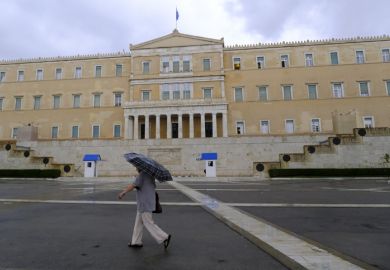One of England’s biggest private colleges, where students received £259 million in three years via the public student loans system, has fallen short of UK quality expectations on two out of four criteria.
In a Higher Education Review by the Quality Assurance Agency, St Patrick’s International College was judged as having to make improvements to meet UK expectations in the quality of, and enhancement of, student learning opportunities.
The college, which offers Higher National courses awarded by Pearson, met UK expectations on the maintenance of academic standards and quality of information about learning opportunities.
In April last year, the QAA published a Concerns report on St Patrick’s, which upheld concerns in two areas – admissions procedures, and student retention and attendance – and outlined areas for improvement.
That Concerns report found dropout rates of more than 30 per cent and reports of fighting in the classroom, and said the college’s recruitment approach included “cold contacts” with prospective students “drawing attention to the potential availability of student loans”.
Prior to the introduction of student number controls at private providers, St Patrick’s was the fastest-growing private college in the country. In 2013-14, it had 7,096 students receiving a total of £33.6 million in fee loans via the Student Loans Company.
Once number controls were introduced the following year, that fell to 2,975 students with £10 million in fee loans.
Total fee and maintenance funding for St Patrick’s students in the past three years comes to £258.8 million, according to SLC data.
The QAA’s review, conducted in November and December 2015, says St Patrick’s is now solely located in Stratford, east London, having closed two sites in central London.
Its report says: “The college gives insufficient emphasis and priority to assuring quality in the processes for the design, development and approval of future programmes and has not yet adopted procedures to satisfy the requirements of the QAA Concerns report with respect to a more formalised and strategic approach to the development and approval of its programmes.”
On admissions, the review notes that since the Concerns report, the college has added literacy and numeracy tests as part of revised admissions procedures.
But the QAA report says that there has been “a lack of provision for appeals and complaints processes and the college has been slow to monitor or evaluate the overall effectiveness of its admissions procedures to ensure that they are supporting the college's mission and strategic objectives”.
It also says: “The review team concludes that students have been unable to access fair, reliable information regarding academic appeals and there is confusion regarding who makes the final decision in regards to academic appeals.”
The review offers recommendations for improvements. It also finds two areas of good practice: individualised support for students provided by academic and support staff, and a range of opportunities to engage students as partners in the assurance of their educational experience.
Daniel Khan, St Patrick’s principal, said: “We are very happy to have two examples of good practice…This reinforces the college's commitment of adopting a student-centric approach and the importance we give to the student voice.
“We accept the final judgment of the review and welcome the recommendations provided. The college will now focus its efforts towards working on an action plan within the agreed timescales with [the] QAA.”
Register to continue
Why register?
- Registration is free and only takes a moment
- Once registered, you can read 3 articles a month
- Sign up for our newsletter
Subscribe
Or subscribe for unlimited access to:
- Unlimited access to news, views, insights & reviews
- Digital editions
- Digital access to THE’s university and college rankings analysis
Already registered or a current subscriber? Login




